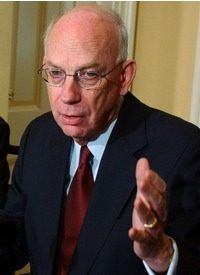
Sen. Robert F. Bennett of Utah has become the first congressional incumbent to be defeated this year. Given that distinct and dubious honor by the delegates at the Utah Republican Convention on Saturday, Bennett would still rather be his party’s nominee for U.S. Senate, as he has been for his past three elections.
But Bennett has angered Tea Party activists and other conservatives by voting in 2008 for the bailout of the financial corporations and for cosponsoring a bill to require individuals to purchase health insurance. He was solidly rejected at the convention in Salt Lake City, finishing a distant third in the second ballot, with less than 27 percent of the vote. The two finalists, businessman Tim Bridgewater and Attorney Mike Lee, will face off in the June 22 primary.
{modulepos inner_text_ad}
Speaking with reporters after the voting, Bennett said some of his Senate votes were politically "toxic" and possibly fatal to his career. "The political atmosphere obviously has been toxic and it’s very clear that some of the votes that I have cast have added to the toxic environment," he said. "Looking back on them, with one or two very minor exceptions, I wouldn’t have cast any of them any differently even if I had known at the time they were going to cost me my career." Bennett, 76, left open the possibility that he will run as a write-in candidate, creating a three-way race in the general election, the Associated Press reported. Texas Senator John Cornyn, chairman of the Republican Senate Campaign Committee, immediately announced the committee will support the winner of the GOP primary.
Bennett’s poor showing came despite the endorsements of the National Rifle Association and former Massachusetts Gov. Mitt Romney, who came to the convention and urged the delegates to stick with Bennett. "Today, he faces an uphill battle at this convention," said Romney, who was greeted with a mix of cheers and boos when he made the introductory speech for the three-term Senator. "Some may disagree with a handful of his votes or simply want a new face. But with the sweep and arrogance of the liberal onslaught today in Washington, we need Bob Bennett’s skill, and intellect and loyalty." The argument held little sway with a large majority of the delegates.
"The bailout bothers me. That in and of itself is unforgivable in my opinion," delegate Scott White, a 58-year-old general contractor from Taylorsville, told the A.P. Indeed, Bennett’s vote for the Troubled Assets Relief Program bill was unpopular enough to gain him the nickname "Bailout Bob" from some of his critics on the Right. About two-thirds of the 3,500 delegates identified themselves as supporters of the Tea Party movement, according to Salt Lake Tribune poll last month.
Bennett tried at the convention to convince voters that he was the reliable fiscal conservative candidate. "You want to get deficits under control. I have authored bills to rein in the entitlement spending that now makes up two-thirds of the federal budget," he told the delegates. "I’ve already voted for a balanced budget amendment three times and I will again, while making certain that it won’t be turned into a tax increase for Democrats. Our tax burden is already too high," he said. Making a final plea just before the second round of voting began, Bennett tried to turn his 18 years in the Senate to his advantage. "Don’t take a chance on a newcomer," he said. "There’s too much at stake." But as Bennett pleaded for a fourth term, some delegates recalled that he had promised to serve only two terms in the Senate when he first was elected in 1992.
The atmosphere that Bennett found "toxic" is not merely the result of anti-incumbent sentiment, however. Utah’s Republican Governor and two Republican Congressman are not facing serious challenges within the party. The state is overwhelmingly Republican and the party’s nomination is considered a virtual lock on a general election win in November.
The rejection may instead reflect a national surge of conservative activism that has seen been evident in races in other states. Florida Governor Charlie Crist, now running as an Independent for the U.S. Senate, recently dropped out a Republican primary in which he was running far behind his conservative rival, former state Speaker of the House Marco Rubio. In Arizona, John McCain is facing a tough primary battle with right-wing talk-show host and former Congressman J.D. Hayworth. Last November Republicans running anti-tax-and-spending campaigns won gubernatorial elections in Virginia and New Jersey. And in January Republican Scott Brown, campaigning against the Obama healthcare plan, stunned the political world with his victory over heavily favored Attorney General Martha Coakely in the special election to fill the Senate seat left vacant by the death of Edward M. Kennedy. The Tea Party movement was especially noticeable in its support the Brown campaign, even as it was conspicuous in its opposition to Bennett. At the Utah convention, David Kirkham told the Associated Press his opposition began with Bennett’s vote on the bailout bill.
"The whole reason I started the tea party (in Utah) was Sen. Bennett," Kirkham said. "He was the next one up for reelection."
Photo of Senator Robert Bennett (R-Utah), right: AP Images



